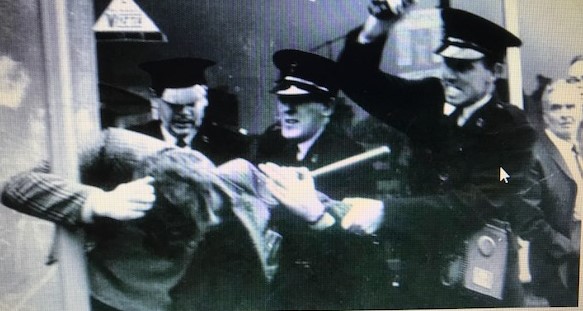Why IRA violence extinguished the hopes of the Civil Rights movement for a peaceful end to inequality
Posted By: October 04, 2017
Republican campaign provoked Unionist anger and dashed dreams of meaningful change, says Alban Maginness.

The civil rights march on October 5, 1968, in Derry.
Alban Maginnes. Belfast Telegraph. Belfast. Wednesday, October 4, 2017
Next year, we commemorate the 50th anniversary of the civil rights movement. We should approach this commemoration with thoughtfulness and an attempt to understand the profound watershed that it was for the politics of Northern Ireland.
Our schools and universities and political parties should actively explore its origins, political development, and historic impact. We should attempt to understand why and how it happened. It was on April 9, 1967, that the Northern Ireland Civil Rights Association (NICRA) was born in the International Hotel in Belfast after a period of about a year’s political gestation. The organization itself was modeled on the National Council for Civil Liberties, based in London.
Its founding executive was made up of a mixture of different political colors, mainly on a very fragmented Left, which included trade unionists, the Communist Party, Republican Labor (the- then party of the newly elected MP for West Belfast, Gerry Fitt), the Republican Wolf Tone Societies, Northern Ireland Labor Party and also the Ulster Liberal Party. There was even a Young Unionist co-opted onto the executive. What NICRA demanded was, on the face of it, very reasonable indeed. One man, one vote in local government elections, an end to gerrymandering, an end to discrimination in jobs and an end to discrimination in public housing. In addition, the repeal of the repressive Special Powers Act and the disbandment of the ‘B Specials’, who were an auxiliary reserve to the RUC.
But the main emphasis was on social rights that could improve the lot of ordinary people, who were suffering from years of discrimination in jobs and houses.
The political strategy behind all this was that these civil rights were demonstratively denied, but that the campaign for them had nothing to do with traditional Orange and Green politics.
It has to be understood that the Civil Rights agitation was something completely new to northern politics. It was a demand for British civil rights from a Unionist government (then in power for almost 50 years) that purported to support those very same British civil rights. It was a campaign that was broad-based, non-sectarian and non-party, and employed non-violent methods of campaigning.
There has been much contention, by Unionists in particular, as to whether NICRA was a political Trojan horse designed to destabilize politics in Northern Ireland and bring about, by hook or by crook, a united Ireland.
It is a legitimate question that needs to be addressed, as some of those behind NICRA were undoubtedly members of the old Republican Movement.
But they were joined by others, who were not Republican, but were simply socially concerned people campaigning for political and social reform.
An outstanding example was Dr. Conn McCloskey, who, for a number of years previously, had been engaged in the Campaign for Social Justice for housing and other basic rights.
Whatever the motives of the founders of NICRA, the Civil Rights movement that it created went well beyond what they originally imagined and took on a life of its own.
The movement was greatly influenced by the civil rights campaign in the USA under the inspirational leadership of Dr. Martin Luther King Jr, who advocated peaceful political change through direct, non-violent action. The brutal suppression by the RUC of the civil rights march in Derry on October 5, 1968, broadcast on TV for all to see, so outraged public opinion here and in England that overnight it made Civil Rights into a popular mass movement for change.
From there on, it went from strength to strength and within a very short period achieved practically all of its aims, including one man, one vote. The civil rights movement, in attaining such rapid success, had paved the way for a potential new political dispensation within a reformed Northern Ireland.
Its success was in being non-violent and in attempting to reform The North and its institutions. It transcended Orange and Green politics in its political and social demands.
Austin Currie, one of its most pivotal leaders, described the civil rights movement as: ” … the most successful political force since partition … All the demands were granted within a very short period of time.”
But, alas, there was to be no new political dispensation, because of extreme Unionist opposition to any reform, led principally by the Rev. Ian Paisley.
Furthermore, the breakaway Provisional IRA emerged and commenced an offensive paramilitary campaign against the State, thus resurrecting the whole issue of The Border and provoking sectarian violence. In doing so, they undermined the civil rights movement, played into the hands of extreme Unionism and created a vicious spiral of violence that extinguished an historic opportunity to consolidate reform and usher in an era of peaceful change and the hope of non-sectarian politics.










